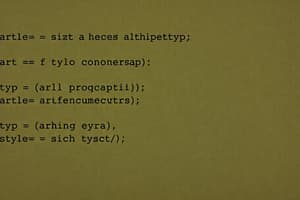Podcast
Questions and Answers
What will the output be if the variable age is set to 20 in the following code: if age >= 18: print('You are an adult.'); else: print('You are a minor.')?
What will the output be if the variable age is set to 20 in the following code: if age >= 18: print('You are an adult.'); else: print('You are a minor.')?
- Invalid input.
- You are an adult. (correct)
- Age is undefined.
- You are a minor.
In the provided elif statement example, what will be printed if the variable grade is set to 70?
In the provided elif statement example, what will be printed if the variable grade is set to 70?
- Good
- Excellent
- Average
- Needs Improvement (correct)
What is the primary purpose of the else statement in a conditional structure?
What is the primary purpose of the else statement in a conditional structure?
- To terminate the program.
- To execute code when previous conditions are false. (correct)
- To define a function.
- To check for additional conditions.
If the condition in an if statement evaluates to False, which statement will be executed next?
If the condition in an if statement evaluates to False, which statement will be executed next?
In the context of flowcharting versus programming code, what is primarily being compared?
In the context of flowcharting versus programming code, what is primarily being compared?
What does decision making in programming primarily involve?
What does decision making in programming primarily involve?
Which symbol in a flowchart typically represents a decision point?
Which symbol in a flowchart typically represents a decision point?
Which Python statement is used to handle alternative paths in decision-making?
Which Python statement is used to handle alternative paths in decision-making?
In a simple flowchart for a rollercoaster height check, what is the first action represented?
In a simple flowchart for a rollercoaster height check, what is the first action represented?
What will the following Python code output if age is set to 17?
if age >= 18:
print('You are an adult.')
What will the following Python code output if age is set to 17?
if age >= 18: print('You are an adult.')
When using the if-else structure, what happens when the if condition is True?
When using the if-else structure, what happens when the if condition is True?
What is the purpose of flowchart arrows?
What is the purpose of flowchart arrows?
Which of the following is NOT a component of a flowchart?
Which of the following is NOT a component of a flowchart?
Flashcards
What does the else statement do?
What does the else statement do?
An else statement provides an alternative action to be executed if the condition in the preceding if statement is False.
What's the purpose of the elif statement?
What's the purpose of the elif statement?
The elif statement allows you to check multiple conditions sequentially. It only executes if the previous if or elif conditions are False.
What is a flowchart?
What is a flowchart?
A flowchart is a visual representation of a program's flow using symbols and arrows. It helps to visualize the steps and decision points in a program.
What does an if statement do?
What does an if statement do?
Signup and view all the flashcards
What is the purpose of the 'else' statement in Python?
What is the purpose of the 'else' statement in Python?
Signup and view all the flashcards
Decision Making in Programming
Decision Making in Programming
Signup and view all the flashcards
Conditional Statements
Conditional Statements
Signup and view all the flashcards
Flowcharts
Flowcharts
Signup and view all the flashcards
Oval Symbol in Flowcharts
Oval Symbol in Flowcharts
Signup and view all the flashcards
Diamond Symbol in Flowcharts
Diamond Symbol in Flowcharts
Signup and view all the flashcards
Rectangle Symbol in Flowcharts
Rectangle Symbol in Flowcharts
Signup and view all the flashcards
Arrows in Flowcharts
Arrows in Flowcharts
Signup and view all the flashcards
The 'If' Statement in Python
The 'If' Statement in Python
Signup and view all the flashcards
Study Notes
Structure Programming
- Course taught by Dr. Safa Elaskary and Dr. Manar Elshazly
- Semester: Fall 2024-2025
Variables and Data Types
- Variables have associated data types
- Integer type: whole numbers (e.g., 124)
- Float type: numbers with decimal points (e.g., 124.56)
- String type: text (e.g., "Hello world")
- Boolean type: True or False (used in conditional statements)
Arithmetic Operators
- Symbol | Task Performed | Example | Result
- --|---|---|---
- | Addition | 4 + 3 | 7
- | Subtraction | 4 - 3 | 1 / | Division | 7 / 2 | 3.5 % | Modulo | 7 % 2 | 1 * | Multiplication | 4 * 3 | 12 // | Floor division | 7 // 2 | 3 ** | Exponentiation | 7 ** 2 | 49
Comparator Operators
- Operator | Description
- --|---| == | True if x and y are equal != | True if x and y are not equal < | True if x is less than y
| True if x is greater than y <= | True if x is less than or equal to y = | True if x is greater than or equal to y
Lecture 2: Decision Making (If-Else Statements)
- Decision making in programming involves choosing different paths based on conditions.
- Conditional statements guide a program's flow, allowing it to make decisions and run specific code blocks based on whether conditions are True or False.
Flowchart Symbols
- Oval: Represents the start or end of a process
- Diamond: Represents a decision point (e.g., True/False or Yes/No)
- Rectangle: Represents actions or steps to be executed
- Arrows: Indicate the flow direction between steps
Python Conditional Statements (if, else, elif)
if,else, andelifstatements are used to manage decision-making within Python code.- These statements evaluate specific conditions and execute the corresponding code blocks based on whether the conditions are True or False.
Simple Flowchart Example (Rollercoaster)
- Flowchart for determining coaster access based on height
- Input: Height
- Decision: Is height greater than or equal to 120 cm?
- Decision Outcomes:
- Yes: Allow to ride
- No: Deny access
The if Statement
if condition:- This statement executes a block of code if the condition is True.
The else Statement
else:- Executes an alternative code block if the
ifcondition is False.
The elif Statement
elif condition:- Tests multiple conditions sequentially; executes the code block corresponding to the first True condition.
if, elif, else Example (Grade Evaluation)
- Program evaluates a student's grade and prints a corresponding message based on defined conditions.
Flowchart vs Code Example (Grade Evaluation)
- Translation of flowchart steps into Python code to evaluate and categorize student grades.
Example Python if...else Statement (Positive/Negative Input)
- Demonstrates basic use of
ifandelseto check for positive or negative integer input.
Example Python if...elif...else Statement (Number Classification)
- Demonstrates branching logic to classify numbers as positive, negative, or zero.
Examples of if, elif, else statements with various conditions
- Demonstrates practical applications such as verifying if the value matches a particular condition, comparing values etc
Studying That Suits You
Use AI to generate personalized quizzes and flashcards to suit your learning preferences.




